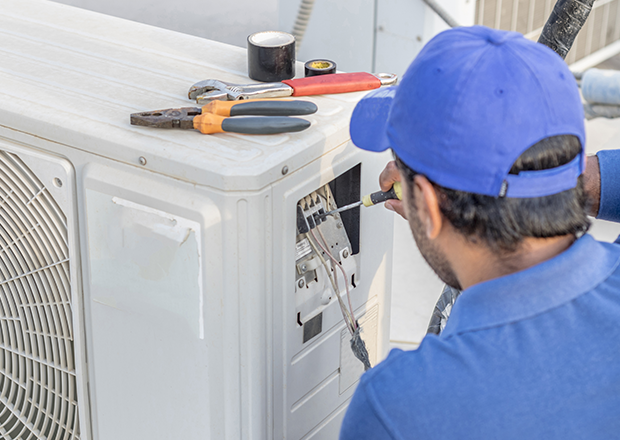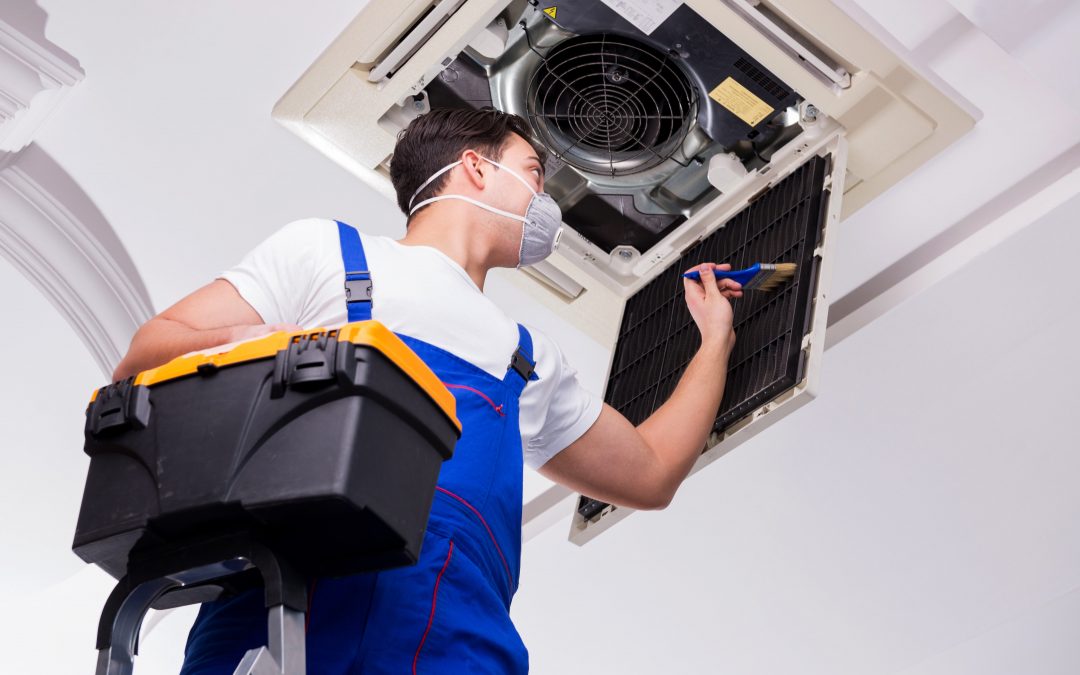All Regarding HVAC: Identifying Common Issues and Effective Air Conditioning Repair Work Techniques
Cooling and heating systems are essential for maintaining interior convenience. Recognizing their parts and capability is important for determining typical issues. Homeowners often encounter troubles such as inefficient air conditioning, odd odors, or rising power costs. These indicators can suggest underlying issues that may need interest. Discovering do it yourself troubleshooting strategies can be beneficial, but knowing when to seek expert assistance is similarly essential. What steps can be taken to ensure resilient performance?
Comprehending Your A/c System: Components and Functionality
A cooling and heating system, usually thought about the foundation of interior environment control, includes several crucial parts that function with each other to manage temperature level and air high quality. The main elements include the home heating unit, air flow system, and air conditioning system. The home heating system, typically a furnace or boiler, generates heat throughout chillier months, while the air conditioning unit cools down interior spaces throughout the summer season.

Usual HVAC Issues House Owners Experience
Homeowners typically deal with numerous usual heating and cooling issues, consisting of inconsistent temperature distribution throughout their space. Furthermore, uncommon sounds throughout procedure can show underlying concerns that require attention. Attending to these problems without delay is essential for maintaining optimal system efficiency.
Irregular Temperature Circulation
Numerous households experience the frustrating problem of irregular temperature level circulation, where particular rooms really feel annoyingly warm while others continue to be too cold. This trouble commonly arises from a selection of elements, consisting of poor insulation, obstructed vents, or a poorly sized heating and cooling system. When air ducts are not sufficiently secured or when furniture obstructs air movement, some areas might get inadequate cooling. Furthermore, thermostat placement can significantly impact temperature level law; a thermostat situated in a sunlit area may misstate the total temperature of the house. Regular maintenance, consisting of cleansing filters and guaranteeing ductwork is clear, can help alleviate these inconsistencies. House owners might also think about zoning systems to far better control temperatures throughout different areas of the home, advertising a more comfortable living environment.
Uncommon Sounds During Procedure
When a cooling and heating system runs, uncommon sounds can show underlying problems that call for attention. Property owners might run into a series of sounds, such as grinding, squealing, or hissing. Grinding sounds frequently signal worn-out bearings or elements, while squeaking can suggest loose belts or parts needing lubrication. Hissing may suggest a refrigerant leakage, which can endanger the system's performance. Additionally, banging audios could direct to loose ductwork or an issue with the blower fan. Each of these sounds acts as a warning, prompting property owners to examine additionally. Neglecting these indications can cause more considerable problems and costly repairs. Regular upkeep and punctual focus to uncommon noises can enhance system longevity and efficiency, making certain a comfy living atmosphere.
Indications That Indicate Your Air Conditioning Needs Repair
Exactly how can one inform if their air conditioning unit requires repair? A number of indications might indicate underlying issues needing specialist attention. First, if the a/c falls short to cool the space successfully, it might recommend a cooling agent leak or compressor malfunction. Furthermore, a rise in energy costs without matching usage adjustments can signal inefficiency in the system. Property owners must also look out to unusual scents rising from the system, which might show mold growth or electrical problems. Moreover, if the a/c regularly cycles on and off, it may be a sign of a defective thermostat or various other mechanical issues. Finally, the visibility of water merging around the device can show a stopped up drainpipe line. Recognizing these signs early can conserve money and time, making sure that the a/c system operates efficiently and effectively.
DIY Troubleshooting Techniques for HVAC Issues
When encountering HVAC issues, house owners can use several DIY fixing strategies to recognize the issue. Trick approaches include checking thermostat settings, checking air filters, and reviewing water drainage issues. These steps can help identify typical malfunctions prior to seeking professional support.
Checking Thermostat Settings
What steps should property owners take to assure their thermostat settings are proper? They should validate the thermostat is set to the preferred temperature level and mode, whether heating or air conditioning. Checking for a clear screen and validating the thermostat is not established to "hold" check this or "holiday" setting is necessary. Property owners ought to likewise validate that the thermostat is degree and mounted in a location without drafts, direct sunlight, or other temperature affects. Additionally, altering the thermostat can assist offer precise analyses. If the thermostat runs on batteries, replacing them may fix any kind of concerns. By systematically evaluating these factors, homeowners can frequently identify and fix thermostat-related troubles, promoting perfect a/c system efficiency.
Inspecting Air Filters
Air filters play an essential role in preserving ideal HVAC efficiency. They trap dirt, allergens, and other particles, making certain tidy air blood circulation. In time, filters can end up being clogged, reducing air movement and effectiveness. To inspect air filters, individuals need to initially situate the filter, usually located Visit This Link in the return air duct or near the heating system. When situated, they should evaluate the filter's condition-- if it appears unclean or blemished, it most likely demands substitute. A lot of filters require transforming every 1-3 months, depending upon usage and ecological factors. Regular evaluation and prompt substitute of air filters not only boost air high quality yet likewise prolong the life expectancy of cooling and heating systems, protecting against possible malfunctions and expensive fixings.
Assessing Drainage Issues
Exactly how can house owners successfully identify and deal with water drainage problems within their HVAC systems? They must check the condensate drain line for obstructions or blockages, which can lead to water accumulation. Home owners might use a wet/dry vacuum to clear any particles obstructing the line. Next off, examining the drain pan for corrosion or leaks is vital, as a harmed frying pan can trigger water to overflow. Regular cleaning of the drain line with a blend of vinegar and water assists protect against future clogs. In addition, making certain correct incline of the drainpipe line promotes efficient water circulation. If these DIY techniques do not solve the problem, consulting a specialist Visit Website cooling and heating technician may be required to stay clear of possible water damages and system failing.
When to Call a Professional for Air Conditioner Fixings

While some air conditioning issues can be taken care of via do it yourself methods, there are scenarios where calling an expert comes to be vital. Home owners must look for expert aid when they experience persistent troubles, such as inadequate air conditioning, weird noises, or unusual odors emanating from the device. These signs may indicate much deeper problems that call for specialized understanding and devices to identify and fix properly.

Preventative Upkeep Tips for Heating And Cooling Long Life
Routine preventative maintenance can considerably enhance the longevity of a/c systems. Property owners need to set up annual assessments by qualified service technicians to analyze system efficiency and identify possible issues. Regularly altering or cleansing air filters is important, as this warranties proper air movement and reduces stress on the system. In addition, inspecting and securing ductwork avoids power loss and enhances overall efficiency.
It is also recommended to maintain the outdoor system free from particles and greenery, enabling peak airflow and warm exchange. Homeowners ought to check the condensate drainpipe for blockages to prevent water damages and mold and mildew growth. Furthermore, preserving ideal thermostat settings and using programmable alternatives can boost energy effectiveness. Recording maintenance activities assists track solution history and can aid in recognizing persisting problems. By complying with these preventative procedures, individuals can optimize the effectiveness and life-span of their HVAC systems
Often Asked Concerns
Just how Typically Should I Change My A/c System Filters?
A/c system filters must normally be changed every one to three months, depending on use, filter kind, and ecological factors. Regular replacement helps preserve efficiency and air quality, making certain peak system efficiency throughout the year.
What Dimension Heating And Cooling System Do I Required for My Home?
To establish the suitable HVAC system size for a home, one must consider square video footage, insulation quality, and local climate. Consulting an expert can aid ensure optimal performance and comfort for the certain living room.
Are There Eco-Friendly Cooling And Heating Options Available?
Yes, environmentally friendly cooling and heating alternatives are available, including energy-efficient heat pumps, solar-powered systems, and geothermal heating. These choices minimize energy usage and ecological impact, promoting sustainability while preserving reliable climate control for domestic and industrial rooms.
How Can I Boost My HVAC System's Energy Effectiveness?
To enhance heating and cooling energy efficiency, one can routinely maintain the system, seal air leakages, mount programmable thermostats, utilize energy-efficient filters, and assurance sufficient insulation throughout the home to reduce energy usage and boost performance.

What Is the Ordinary Life Expectancy of an A/c System?
The average lifespan of a HVAC system normally ranges from 15 to 25 years, depending upon aspects such as upkeep, use, and the quality of setup. Routine maintenance can considerably extend its operational longevity.
Final thought
In summary, a complete understanding of heating and cooling systems encourages property owners to determine usual problems and address small issues effectively. Identifying indications of malfunction, utilizing do it yourself fixing strategies, and prioritizing normal maintenance can improve system efficiency and effectiveness. However, when confronted with complex repair work, getting specialist help is critical to guarantee security and longevity. By cultivating recognition and proactive care, individuals can enjoy a comfy interior atmosphere while lessening unforeseen costs related to cooling and heating failures.